Replacing the heating element in the washing machine: how to carry out repairs, advice from the masters
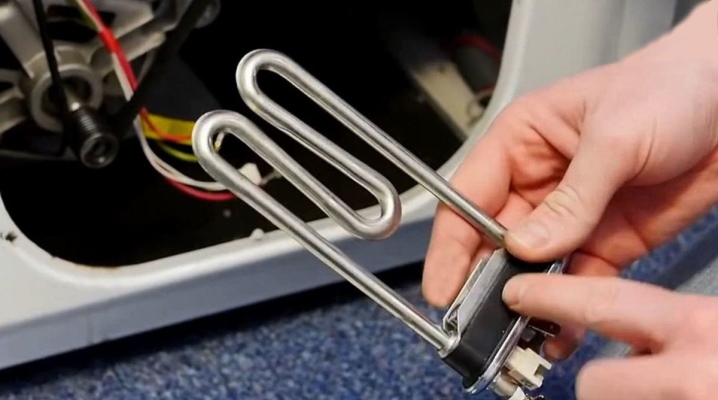
Nowadays, washing machines are present not only in every city house, they are good household helpers in villages and villages. But wherever such a unit is located, it will ever break down. The most common of them is the failure of the heating element. Let's consider how to carry out such a repair, and find out what the professionals advise.

Malfunction symptoms
Each breakdown can be identified by some signs. Knowing what "symptoms" a certain malfunction may have, you can unmistakably understand which spare part is the cause. Based on many years of experience in repairing various washing machines, experts identify 3 main factors that indicate a breakdown of the heating element.
- The water heating process does not start, but the wash program does not stop. Certain types of washing machines have a program that performs washing in cold water, so before calling the master or starting to disassemble the machine, check which washing mode and temperature are currently set. If you still did not make a mistake with the installation of the program, and the water still does not heat up, then we can conclude that the heating element is malfunctioning. Some of the old models of washing units, when the heating element fails, begin to spin the drum endlessly in anticipation of the necessary heating of the water. Modern machines can give an error in the operation of the heating element even before the start of the washing process.
- Second symptom of malfunction Is the tripping of a circuit breaker in the power supply network. Most often this happens some time after turning on the washing machine at the moment when the water heating should start according to the program. The reason for this "behavior" of the circuit breaker is caused by the closure of the electrical circuit on the spiral of the heating part.
- In the third case, the residual current device is triggered, through which the unit is connected to the mains... If this happens at the moment the heating element is turned on, it means that the heating element has a current leakage to the case. This is due to damaged insulation.
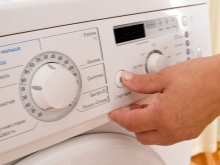
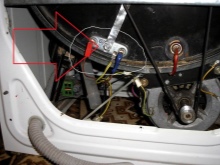
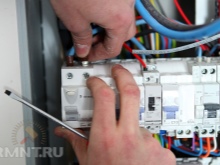
The listed signs cannot be called absolutely accurate, they are still considered indirect, but 100% confirmation can be obtained only after disassembling the device and ringing the heating element with a multimeter.
How to find a breakdown?
After identifying indirect signs, it is necessary to find a breakdown. To inspect and take measurements, it is necessary to partially disassemble the washing machine, gaining free access to the electrical part of the heater.
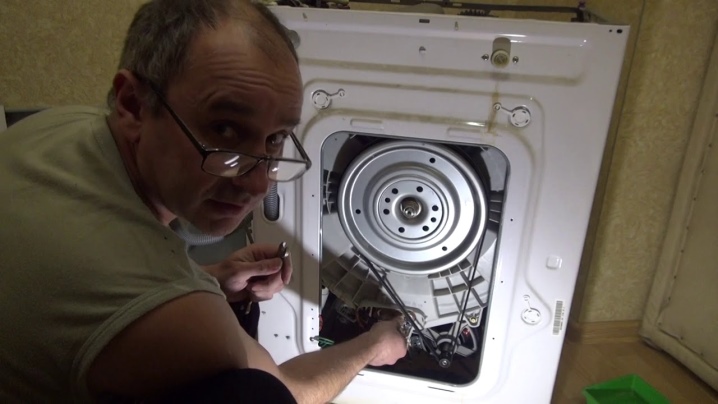
Not in every case, the absence of water heating is evidence of a breakdown of the heating element - contacts on it could oxidize, and one of the wires could simply fall off. In this case, it is not necessary to change the heating element, but it is enough just to clean the contacts and securely attach the fallen off wire.
If a cursory inspection did not reveal obvious defects on the electrical part of the heating device, then it is necessary to ring it with a special device. - a multimeter. In order for the measurements to be correct, it is worth calculating the resistance of a specific heating element. To do this, we need to know exactly what power it has. It is usually written in it and in the instructions for use. Further calculation is simple.
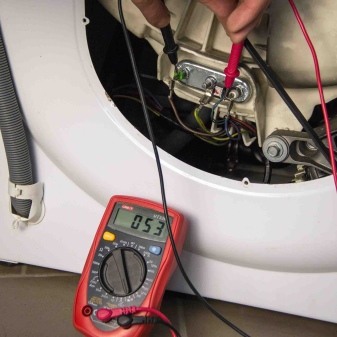
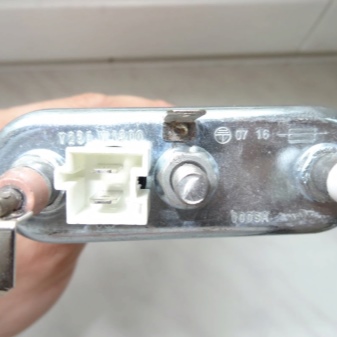
Let's say that the power of your heating element is 2000 watts. To find out the working resistance, you need to square the voltage of 220V (multiply 220 by 220). As a result of the multiplication, you get the number 48400, now you need to divide it by the power of a specific heating element - 2000 W. The resulting number is 24.2 ohms. This will be the resistance of a working heater. Such simple mathematical calculations can be performed on a calculator.
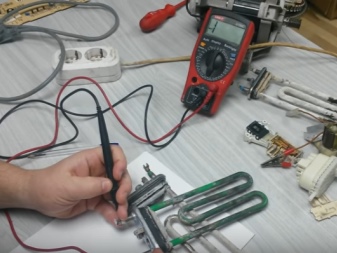
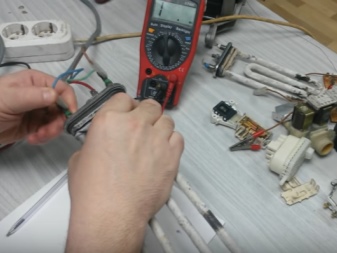
Now it's time to start dialing the heating element. First you need to disconnect all the wiring from it. The next step is to switch the multimeter to a mode that measures resistance, and select the optimal range of 200 ohms. Now we will measure the parameter we need by applying the probes of the device to the connectors of the heating element. The working heating element will show a figure close to the calculated value. If the device showed zero during measurement, this tells us about the presence of a short circuit on the measured device, and this element needs to be replaced. When the multimeter showed 1 during the measurement, it can be concluded that the measured component has an open circuit and also needs to be replaced.
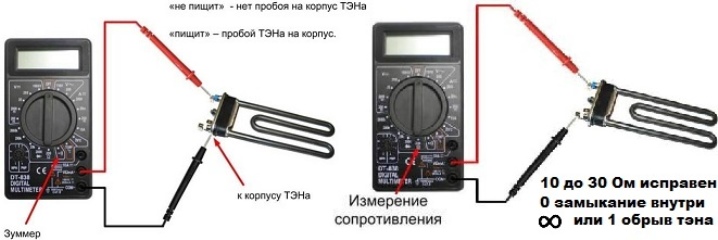
How to remove?
Repair work with any household appliance begins with unplugging it from the outlet. Then you can proceed directly to the removal of the heating element itself. It is worth considering that there are such types of washing machines in which the heating element is located on the back of the tank, and there are also those in which the heater is located in front (relative to the tank). Let's consider dismantling options for each type of installation.
If is ahead
To remove the heater from a machine with this design, you will need to do the following:
- first you need to remove the front panel;
- dismantle the bunker for washing powder;
- remove the sealing collar, for this you need to stretch the fixing clamp, and fill the seal inward;
- now we remove the front panel;
- disconnect the terminals on the door lock;
- when all unnecessary is removed, you can start dismantling the heating element itself, for which you will need to disconnect all wires;
- unscrew the fixing nut and press the fixing bolt inward;
- before pulling out the part, you need to shake it a little.
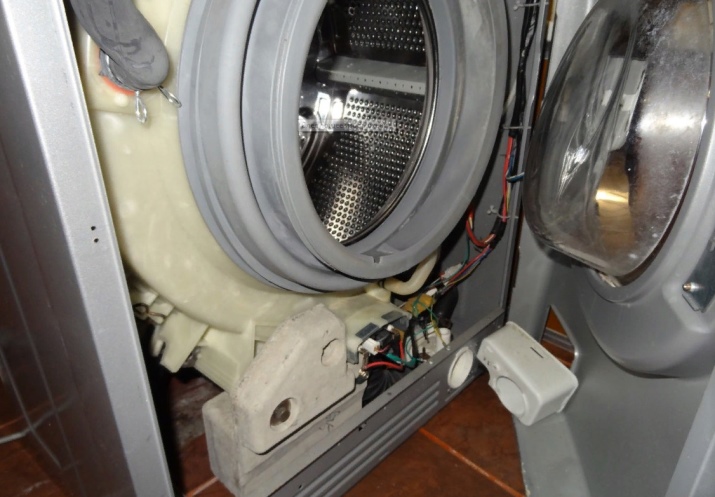
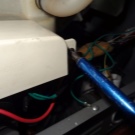
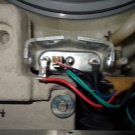
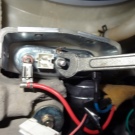
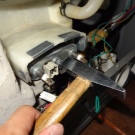
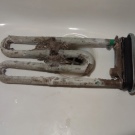
After successfully dismantling the old faulty heating element, it is necessary to clean its seat from scale and dirt. Only then is it allowed to boldly install a new heating element. Its fixation occurs in the reverse order.
If behind
Consider the sequence of removing the heating element from the washing machine, in which this part is installed on the back of the tank. For this we need:
- disconnect the device from all communications;
- unscrew the screws on the back panel and remove it;
- now we got full access to the heating element and its wires, they must be turned off;
- unscrew the fixing bolt and press it inward;
- The heating element is pulled out hard, so you need to pry it off with a flat screwdriver;
- after removing the element we need, thoroughly clean its seat;
- we install the new heating element in its place, and so that the rubber seal fits easily, it can be slightly greased with soap or dishwashing detergent;
- we connect all the wiring back, and we assemble the device in the reverse order.
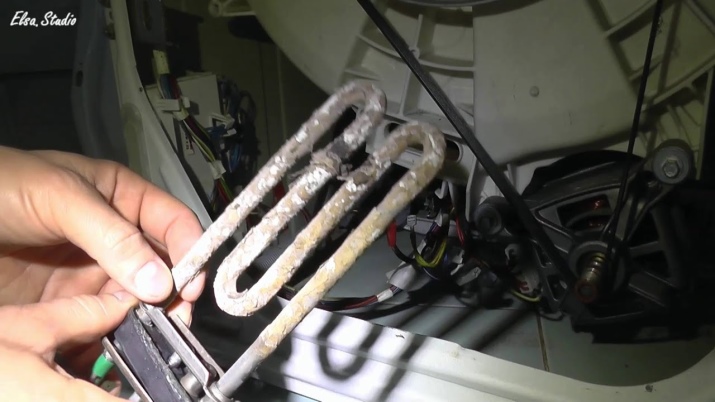
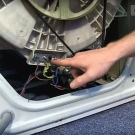
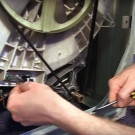
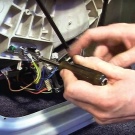
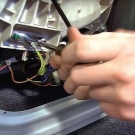
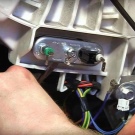
How to replace and install?
Before you start repairing the washing machine, you need to drain the water from it and disconnect it from the electrical network. Further to start repair work, you need to prepare a set of wrenches, flat and Phillips screwdrivers, pliers or pliers.
Before starting disassembly, it is necessary to understand on which side the heating element is located in the structure of the washing machine. It depends on the features of the device of a particular model of household appliances. When all unnecessary attachments are removed, the master will see only the back of the heating element, on which the power wires and the fixing nut will be fixed.To dismantle the heater, it is necessary to disconnect all wires and unscrew the nut. Next, you need to get the old heater. For this you need:
- using a screwdriver, push the fixing bolt into the inner cavity of the tank,
- then pry the heating element with a screwdriver and remove it with swinging movements.
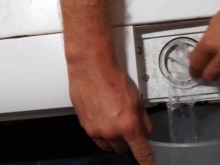
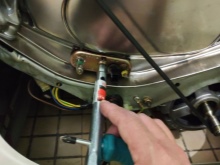
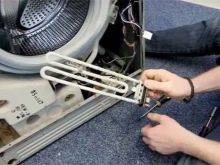
It is best to replace the defective part with a new one. This will allow you to forget about the problems with the heating element for a long time, in contrast to its repair.
During the installation of a new part, it is necessary to achieve a tight fit into place without distortions and kinks of the rubber seal. If this is not done, water will leak from under the gum - this is not good.
After installation, secure fixation of the new heating element and its connection, do not rush to finally assemble the washing machine., but check if the new heater works. To do this, start washing at a temperature of 60 degrees, and after 15-20 minutes. touch the door glass. If it is hot, it means that the heating element is working properly, and the problem has been successfully eliminated. Now you can finally assemble the car and put it in its place.
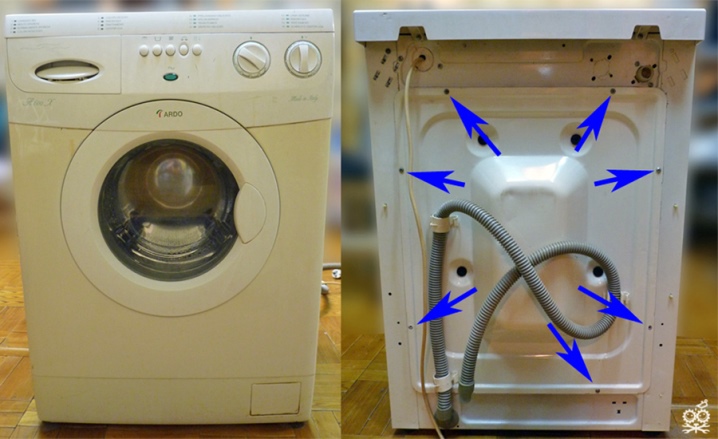
The algorithm for replacing the heating element is the same for almost all modern brands of washing machines and has minor discrepancies. The difference can only be in the difficulty of access. This procedure is simple and does not require special skills, so it can be done on your own without calling specialists.
Tips from the masters
Before starting independent work on replacing the heating element of the washing machine it is advisable to consider a few helpful tips.
- Unfortunately, most of the apartment buildings are old and many private houses are not grounded. This significantly increases the likelihood of getting an electric shock if the insulation of the heating element is damaged. If such a serious problem is found, it is necessary to disconnect the device from the electrical network, then call a master or make repairs yourself.
- After installing the heating element, it is advisable to check the tightness of the sealing gum. To do this, pour hot water into the tank above the heating element level. If water is leaking from the gum, you will need to tighten the nut slightly. If this simple procedure did not have any effect, it is necessary to reinstall the heating element. Perhaps, somewhere on the elastic band there is a hall.
- In the inner cavity of the tank, the heating element is fixed with a metal bracket. If the heating element does not hit it, then it will stand unevenly and will start to touch the drum during washing. As a result, the heater will quickly fail.
- To determine on which side the heater is located in your typewriter, you can use a flashlight and illuminate the inside of the drum. This method is often used by craftsmen when repairing cars. Only for this method of determination is it necessary to have good eyesight.
- In order not to get confused in the wiring and not to guess during assembly which wire comes from where, it is advisable to mark them with a marker or photograph them. This method will save you a lot of reassembly time.
- Disconnect the wires carefully when disassembling such household appliances. You should not make too sharp movements and pull out the necessary parts with zeal. This could cause serious damage to the device.
- Replacing the heating element is not the most difficult task, but you should not resort to it if you know absolutely nothing about the device of washing machines or are afraid to make serious mistakes. In such a situation, it is better to call professional craftsmen or visit a service.
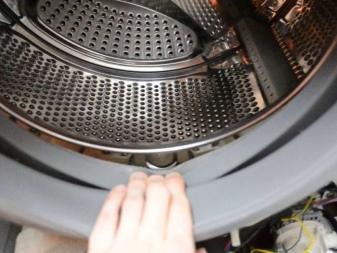

If your equipment is still under warranty, you cannot repair it yourself. This may end the warranty for your device, so don't experiment.
An illustrative algorithm for replacing the heating element is given below.













The comment was sent successfully.